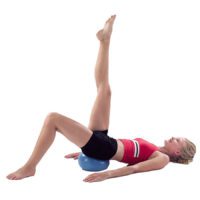Ensuring Workout Safety with Anti-Burst Exercise Balls
Introduction
When it comes to enhancing your fitness routine, safety should always be a top priority. Anti-burst exercise balls have emerged as a crucial tool in providing a safe yet effective workout experience. These balls, known for their durability and safety features, are a favourite among physiotherapists and fitness enthusiasts alike.
What Makes Anti-Burst Exercise Balls Special?
Unlike standard exercise balls, anti-burst variants are designed to withstand high pressure and unexpected punctures. This unique feature reduces the risk of injury, ensuring a safer workout session. The key lies in their thick casing and high anti-burst rating, typically above 300+kg. This rating indicates the ball’s ability to handle significant weight without bursting, a feature not found in cheaper alternatives.

Benefits of Using Anti-Burst Exercise Balls
- Improved Safety: The controlled deflation in case of a puncture minimises the risk of falls or injuries.
- Enhanced Stability and Balance: Regular use can enhance core strength, balance, and stability.
- Versatility in Workouts: Ideal for a variety of exercises, including weight training and core workouts.
- Long-Term Durability: Their robust construction ensures they retain shape and functionality over time.
A Physiotherapist’s Perspective
Physiotherapists recommend these balls for their ability to improve posture, core strength, and balance. Exercises performed on an anti-burst ball engage multiple muscle groups, making them an excellent choice for rehabilitation and fitness enhancement.
What to Do?
If you’re considering incorporating an exercise ball into your routine, consult a physiotherapist for tailored advice. They can recommend specific exercises based on your fitness level and health needs.
Conclusion
Incorporating an anti-burst exercise ball into your fitness regime is a smart choice for anyone looking to enhance their workout safety and effectiveness. Whether you’re rehabilitating from an injury or aiming to strengthen your core, these balls offer a versatile and safe option.
FAQs
1. What are anti-burst exercise balls?
Anti-burst exercise balls are designed to resist high pressure and unexpected punctures, providing a safer workout experience.
2. How do anti-burst exercise balls improve safety?
They deflate slowly in case of a puncture, reducing the risk of falls and injuries during workouts.
3. What exercises can I do with an anti-burst exercise ball?
You can perform a variety of exercises, including core strengthening, weightlifting, and balance training.
4. How do I choose the right size exercise ball?
Choose an exercise ball size based on your height. When seated on the ball, your knees should be at a right angle.
5. Can anti-burst exercise balls be used for rehabilitation?
Yes, they are excellent for rehabilitation, improving posture, and enhancing core strength.
6. Do I need to consult a physiotherapist before using an exercise ball?
It’s advisable to consult a physiotherapist to ensure you use the exercise ball correctly and safely, especially if you have existing health conditions.
Related Articles
Musculoskeletal Physiotherapists
- Discover how musculoskeletal physiotherapists manage and treat muscle and joint issues.
What is Sports & Exercise Physiotherapy?
- Learn about the role of sports and exercise physiotherapy in enhancing athletic performance and recovery.
Physiotherapy for Pain Management
- Understand how physiotherapy can effectively manage and alleviate pain.
Enhancing Flexibility and Strength
- Explore exercises and techniques to improve flexibility and muscle strength.
Exercise Prescription for Rehabilitation
- Find out how tailored exercise programs can accelerate your recovery.
- Discover strategies to safeguard against future injuries.
Proprioception and Coordination Training
- Enhance coordination and proprioception to reduce injury risk.
- Understand the role of physiotherapy in post-surgical recovery.
Workplace Injury Rehabilitation
- Explore how physiotherapy can assist in workplace injury recovery.







